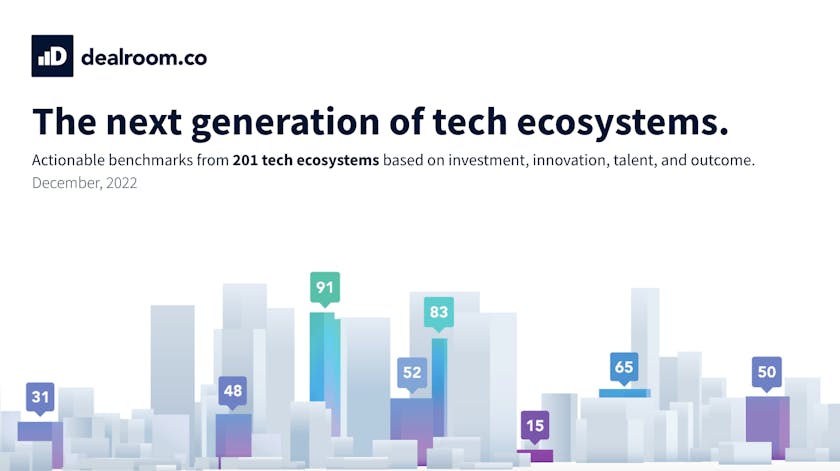The next generation of tech ecosystems

In our most in-depth piece of research on tech ecosystems ever, we’ve created a benchmarking of 200 global tech hubs, to identify the startup cities set to lead the next decade of innovation.
Read more at dealroom.co/startup-ecosystem-benchmarking
Our next startup ecosystem benchmarking uses metrics such as startup success, and venture capital, as well as patent data and university spinouts, the first time these datasets have been combined.
So rather than measuring a status quo, this set of actionable benchmarks is meant as a tool to help ecosystems understand and measure their maturity and preparedness for the future.
Innovation is distributing
The next 20 years of entrepreneurship and innovation are set to be much more distributed than the last.
There are now 168 cities globally that have produced at least one unicorn. This is up from just 12 cities in 2010. The Bay Area no longer has a monopoly on VC-backed innovation. Its share of the world’s new billion dollar companies has dropped from 40% ten years ago, to 20%.
This benchmarking assesses all 168 of these unicorn cities, as well as 32 cities that have had at least $100M in funding and a minimum 50 startup investment rounds since 2017, creating a full picture of both historically leading, and newly emerging tech ecosystems.
For this future-looking analysis, every hub is benchmarked against three lenses: Trailblazers (Scale lens), Science Hubs (per capita lens), and Rising Stars (growth lens).
Trailblazers – Scale lens
When looking at raw scale the top spots are snagged by the usual suspects: the Bay Area, New York and Boston. These Trailblazers lead across almost all metrics. These locales benefit from the presence of strong venture capital sectors and full-stack capital markets. Their success drives the tech and venture capital industry forward globally, hence the term.
Science hubs – per capita lens
The science hub lens is aiming to surface the future tech hubs well positioned to tackle new frontier technologies, such as quantum computing and novel energy. Many deep technologies will have their roots in areas of dense scientific and research talent, and at academic institutions. The Science Hubs lens, more emphasis is placed on deep tech, university talent and patents.
This benchmarking shows some familiar tech hubs, the Bay Area does indeed come out on top due to sheer scale, but also some less hyped startup hub names come to the fore. Cities like Cambridge, Geneva and Boulder featuring highly.
In the US, San Diego, Santa Barbara, and Charlottesville, index higher than more hyped hubs like Miami or New York City. Dutch university town Eindhoven, home to semiconductor giants ASML and NXP, ranks 7th in the world.
Tokyo appears on top for patent filing (powered by Cipher.ai), along with the Bay Area, Seoul, San Diego and Boston.
Rising Stars – (Growth lens)
When considering ecosystem growth many less obvious names rise to the top, often in emerging economies with a lower cost of living. These future tech hubs benefit from the globalization of venture capital and distributed teams, as well as from the presence of local early-stage VCs. However, they lack depth of follow-on investors and require strong connections to bigger ecosystems in order to thrive.
Europe has strength in depth
EMEA is now home to more cities that have produced at least one unicorn (73) than any other world region.
Half of the top science hubs are in Europe, reflecting traditional strengths in academic research and corporate innovation.
While large cities such as London, Paris and Berlin have built scale in their startup ecosystems to rival those of major international tech hubs, some smaller European cities have been found to be dense hubs of major innovation opportunity. Cities like Basel, Leuven and Oxford appear in the top 20 global science hubs. The fundamentals are there to lead in the next defining technologies
Interested?



